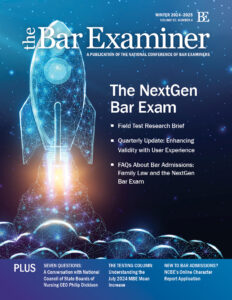This article originally appeared in The Bar Examiner print edition, December 2014 (Vol. 83, No. 4), pp. 2–3.
By Bryan R. Williams I have been involved in the bar examining process for more than 20 years. One of the first things that I tell people when they ask me how one becomes a bar examiner is that there is no real road map. Certainly, while growing up in Indianapolis and dreaming of becoming a lawyer, I thought of many things that I might possibly do with my law degree, but bar examining was never one of those things.
I have been involved in the bar examining process for more than 20 years. One of the first things that I tell people when they ask me how one becomes a bar examiner is that there is no real road map. Certainly, while growing up in Indianapolis and dreaming of becoming a lawyer, I thought of many things that I might possibly do with my law degree, but bar examining was never one of those things.
What I have learned since becoming involved with NCBE is that not only does the process for becoming a bar examiner differ greatly from state to state, but the responsibilities of bar examiners also differ greatly—these differences occurring in a climate where the lawyer licensing process itself is in constant change. (This issue of the Bar Examiner deals with one of these changing areas, the admission of foreign-trained lawyers.)
In New York, as in many states, bar examiners are appointed by the state’s highest court. Unlike in many states, however, in New York bar examiners are actually responsible for drafting the questions for the state-specific part of the exam, grading the questions, and establishing policy for the exam. For bar examiners in New York, this is a year-round endeavor that includes at least monthly meetings and physical attendance at the bar exam two times per year. One of the things that I believe has helped me the most in my role as a member of the NCBE Board of Trustees, as well as in my role as a member of various NCBE committees, is the fact that I have actually written and graded bar exam questions. Question writing, both essay and multiple-choice, as well as essay grading, are skills that I believe a person can only hone over time. Additionally, like the road to becoming a bar examiner, there is no “normal” path to learning the art of writing and grading bar exam questions. That is one reason why attendance at NCBE workshops on question drafting and grading can be so beneficial for bar examiners.
The other area where bar examiners play a major role is that of policy-making. In most states, while the highest court in the state has the ultimate responsibility for bar admissions, the courts rely on the bar examiners to recommend policy that will shape the bar examining process. Accordingly, issues such as setting or changing the passing score on a state’s examination, granting or denying test accommodations for applicants with disabilities, determining educational requirements for foreign-educated candidates in those states where such candidates are allowed to sit for the bar exam, making determinations on cheating or other misconduct, and evaluating character and fitness are all issues that may be decided by a state’s board of bar examiners.
While my role as a bar examiner has always included the drafting and grading of questions, I have never been involved with character and fitness determinations, which is the major, and perhaps only, role of bar examiners in a number of states. In many states bar examiners are charged with the responsibility of not only reviewing bar candidates’ credentials but also conducting hearings and interviews for potential bar applicants, while the drafting of questions and grading of the exam are placed in the hands of law professors.
During my years in bar examining, I have seen significant changes in the bar examining process itself, all to the betterment of the exam. From how exam questions are drafted, to what subject areas are tested, to the types of questions that are used, to the method by which the exam is taken, the bar exam has undergone significant change.
A review of current MBE and MEE questions will show that questions are much more straightforward than when I first became a bar examiner. Fact patterns no longer include distracting fact situations and confusing names. The questions are drafted with the intent and goal to test in a straightforward manner those principles of law that a lawyer just entering the profession needs to know in order to practice competently.
In addition to the standard multiple-choice and essay questions provided by the MBE and MEE, the Multistate Performance Test now allows for the testing of legal skills in a manner that was not available 20 years ago. NCBE continues to explore how to test for other skills needed in practice, such as legal research and writing.
The mechanism for taking the test has also greatly changed through the use of computer testing. I can vividly remember sitting in a room in 2002 and discussing with my colleagues the possible use of a laptop computer to take the bar exam. I can also remember thinking that candidates would never be comfortable taking a bar exam on a computer. Following those discussions, New York started a pilot program limiting the number of computer users to about 250. Now, roughly 10 years after computer testing started in New York, approximately 90% of the nearly 16,000 annual candidates in New York take the bar exam on computers.
Finally, in addition to changes to the exam itself, admission requirements continue to change as many states implement additional requirements for licensure. A number of states require certain courses, activities, or skills training before or soon after admission. New York, for instance, has its new pro bono service requirement where in order to be admitted to practice, applicants must perform 50 hours of pro bono work in addition to passing the bar exam and meeting character and fitness standards.
The road to becoming a bar examiner differs depending on that bar examiner’s particular circumstances. Similarly, the role of a bar examiner encompasses different responsibilities depending on the state in which that bar examiner is located. Certainly bar examiners need to be knowledgeable about all issues surrounding bar examining, especially those cutting-edge issues that lead to change in the process. I encourage bar examiners to stay knowledgeable on the changes in bar examining and to keep an open mind to change.
Best regards to all.
Sincerely,

Bryan R. Williams
Contact us to request a pdf file of the original article as it appeared in the print edition.







